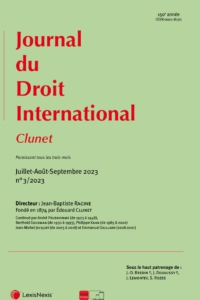Journal du Droit International Clunet – issue 2023/3
The third issue of the Journal du Droit international-Clunet of 2023 was released in July. It contains three articles and many case notes.
The first article Regard québécois sur le projet de Code de droit international priv é français (A view from Quebec on the project of a french private international law Code) is authored by Prof. Sylvette Guillemard (Université Laval). The abstract reads as follows:
é français (A view from Quebec on the project of a french private international law Code) is authored by Prof. Sylvette Guillemard (Université Laval). The abstract reads as follows:
A draft of a French private international law code project was presented to the Minister of Justice in March 2022. As soon as it was submitted, it was immediately commented on by various parties ; its qualities are admired as much as its shortcomings are pointed out. In 1994, the Quebec legislator adopted a book dedicated to private international law in its new Civil Code. After nearly 30 years, it was able to reveal its flaws and demonstrate its advantages. Therefore, neither too old nor too young, it appeared to us as an excellent object of comparison with the French project. At the end of the exercise, we may conclude that French law can only emerge as the winner of this “operation of shaping the rules [of private international law] into a whole”, to borrow the words of Rémy Cabrillac.
Dr Djoleen Moya (Université catholique de Lyon) is the author of the second article Vers une redéfinition de l’office du juge en matière de règles de conflit de lois ? (Towards a redefinition of the obligation for a judge to apply choice-of-law rules?). Dr Moya is continuing the reflection of her doctoral work L’autorité des règles de conflit de loi – Réflexion sur l’incidence des considérations substantielles, recently published. The abstract reads as follows:
The latest developments in matters of divorce, both in domestic law and in private international law, have largely renewed the question of the obligation for a judge to apply choice-of-law rules. Traditionally, the Cour de cassation considers that in matters of divorce, judges must apply, if necessary ex officio, the applicable conflict rule, because unwaivable rights are concerned. However, this solution is under discussion. First, the qualification of divorce as an unwaivable right is questionable, especially since the admission of a purely private divorce by mutual consent in French law. But above all, the Europeanisation of the applicable choice-of-law rules seems likely to call for a new definition the judges’ procedural obligations. If we add to this the recent reorientation of the Cour de cassation’s position and the solutions stated in the draft Code of Private of International Law, the question undoubtedly calls for a reassessment.
The third article is authored by Prof. Sara Tonolo (Università degli Studi di Padova) and deals with Les actes de naissance étrangers devant la Cour européenne des droits de l’homme – à propos de l’affaire Valdís Fjölnisdóttir et autres c/ Islande (Foreign birth certificates before the European Court of Human Rights – about the Valdís Fjölnisdóttir and others v/ Iceland case). The abstract reads as follows:
The European Court of Human Rights ruled on the recognition of the filiation status within surrogacy in the Valdís Fjölnisdóttir and others v. Iceland case. This perspective leaves many questions unanswered and prompts further reflection, particularly with regard to the role that private international law can play in the protection of human rights, in the context of the difficult balance between the protection of the right to private and family life and the margin of appreciation reserved to member states.
The full table of contents is available here.


